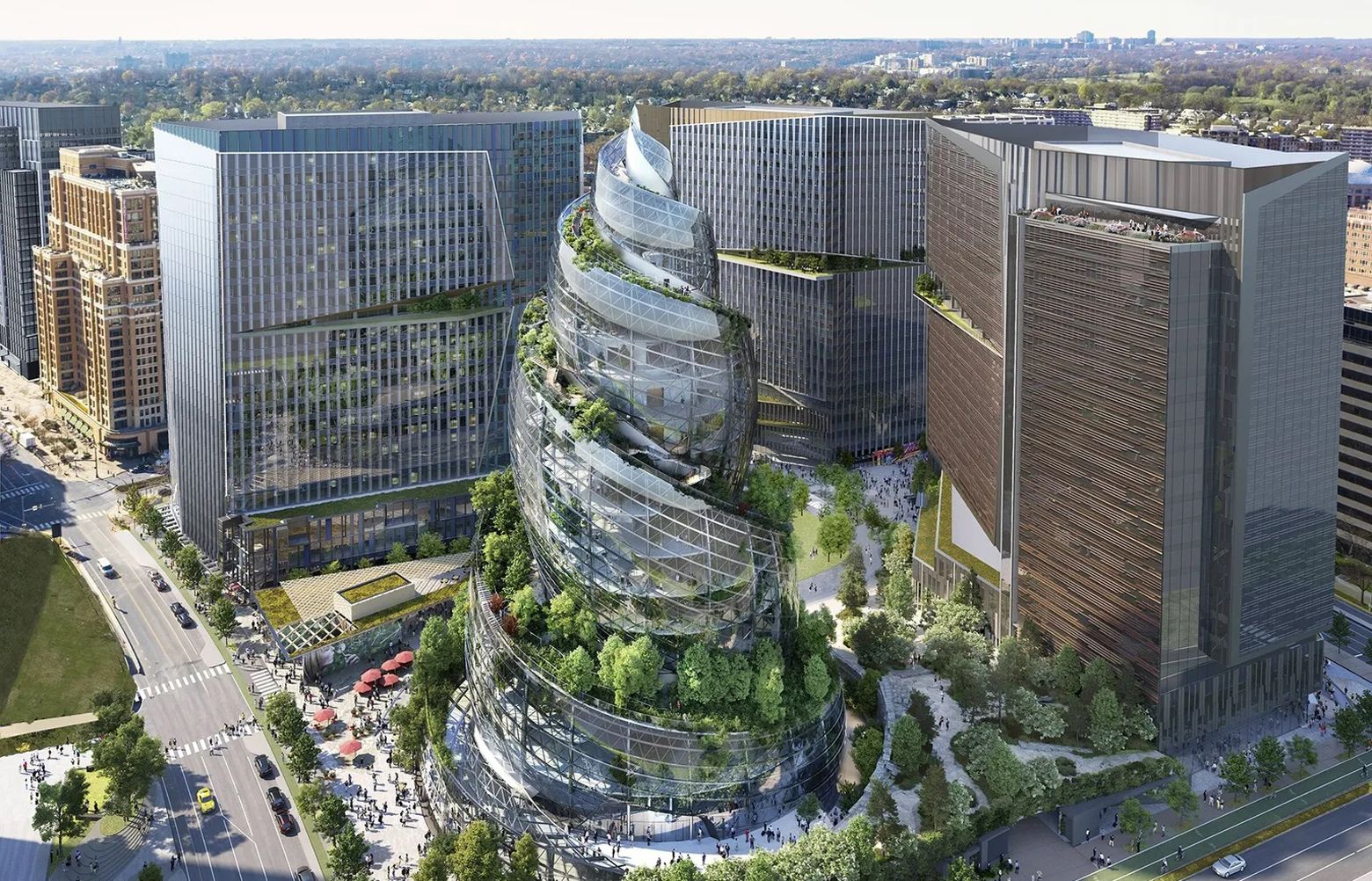 |
| click the image for full sized impact |
This is the Bezos plan for Amazon-East headquarters to fit into the neighborhood in DC. The DC area. Seattle Times reports on Amazon resizing a bit and stretching a timeline here or there. Readers might guess money has something to do with it.
There are two related posts at SeaTimes, "
March 3, 2023 at 2:17 pm Updated March 3, 2023 at 2:17 pm
Readers have the first link, while, in part, the second states:
The company still plans to open 2.1 million square feet of office space that Amazon calls Metropolitan Park in June. But it has paused the second phase of the project. That phase, a 2.8-million-square-foot project called PenPlace, was originally set to break ground in the first quarter of 2023.
Because the first phase will have room for 14,000 employees, Amazon pushed the groundbreaking for the next phase “out a bit,” John Schoettler, vice president of worldwide real estate, said in a statement Friday.
“We’re always evaluating space plans to make sure they fit our business needs and to create a great experience for employees,” Schoettler said. “Our second headquarters has always been a multiyear project, and we remain committed to Arlington, Virginia and the greater Capital Region.”
The decision to halt construction comes as Amazon is reconsidering its footprint and headcount, from corporate offices to retail spaces.
In the Puget Sound region, Amazon’s “HQ1,” the company delayed construction on its Bellevue campus in July and plans to let one of its leases in South Lake Union expire next April. That is only the second major lease the company has let expire during its explosive growth over the past decade. In 2020, Amazon also let go of its lease at 2201 Westlake and planned to relocate about 1,000 employees.
Why?
The company lost $2.7 billion in 2022, according to the most recent financial data. Amazon attributes part of that loss to its investment in Rivian, an electric-vehicle startup that has struggled with production delays.
In the fourth quarter of 2022, Amazon’s reported net income decreased to $300 million. That’s compared with net income of $14.3 billion for the same quarter in 2021.
CEO Andy Jassy told investors in February that Amazon “just had more capacity than we needed.” That realization kicked off an evaluation of all parts of the business, with a search for areas that might not be “big needle movers” for Amazon.
So far, the review has led Amazon to close its physical bookstore, pause expansion of its brick-and-mortar grocery stores and freeze hiring for corporate roles. The company cut 18,000 jobs over the past few months, including 2,300 in Seattle and Bellevue.
“Amazon is not immune to a weaker economy,” Christina Boni, an analyst for Moody’s Investor Services, said in a statement after Amazon’s earnings call in February.
Growth of Amazon Web Services, the company’s cloud computing division, has slowed and online sales have declined, Boni said. But, she said Amazon had made progress to “restore profitability” by reducing excess costs, slowing down investment in its network of warehouses and eliminating some roles.
Analysts for Morgan Stanley noted that Amazon’s management team used the word “streamline/streamlining” six times during a call with investors in February. They said “efficient/efficiencies” five times.
At the same time, Amazon is gearing up to bring workers back to the office.
____________________
"More capacity than we needed" is admission of a classic overcapacity trap, while it appears the firm still is selling online retail like nobody else, and has a lead in the cloud services market, selling more capacity than either Microsoft or Google, or other lesser players providing enterprise levels of cloud access, with DropBox, etc. doing retail. You can buy retail capacity from the Big Three, but each has its own flavor - the what you can do with the capacity, how do you do it nuts and bolts.
As to overcapacity being not a trap but a strategy for market sector dominance that can be scorned and curtailed; see, United States v. Aluminum Co. of America, 377 US 271, 84 S. Ct. 1283, 12 L. Ed. 2d 314 (1964).
As to the other SeaTimes item, Amazon is not the clearly dominant market-share player in retail food marketing, but rather one of the more recent entrants, via purchase of Whole Foods and then developing other outlet designs and locations. But it is making adjustments in that sector as part of income downturn reactions.
See, also: Alexa downsizing.
__________________________
ANCILLARY NOTE: Leaving Amazon current financials and adjustments to next consider aspects of market share dominance: The Alcoa case has been cited a lot (see here and here) but presently much merger, acquisition, and divestiture issues are settled with a joinder proposal publicized and competitors and regulators globally having a say in reaction, where regulatory attention can kill a deal.
Interested readers have these three websearch links to recent developments and activity in the computer chip and computer gaming lines of commerce - Arm Holdings - Nvidia, Microsoft - Activision, Arm Holdings - Qualcomm (Nuvia). The third item differs from the first two because it is a private firm suing for relief in an m&A context after the fact, whereas the first two are m&a proposed deals with regulatory considerations as actual/potential deal killers.
